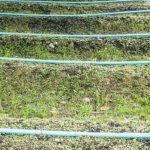Winter cover crops play a vital role in maintaining the health and fertility of organic vegetable gardens during the winter months. These crops not only protect the soil from erosion and compaction but also provide numerous other benefits to organic gardeners.
In this article, we will explore the advantages of utilizing winter cover crops, the best options for organic vegetable gardens, how to plant and care for them, as well as tips for success in incorporating these crops into your gardening practice.
One of the main challenges organic gardeners face during the winter is maintaining soil health and fertility. Winter cover crops are a sustainable solution to this issue, providing a natural way to protect and improve soil quality without relying on synthetic fertilizers or chemical additives. With their ability to suppress weeds, enhance soil structure, and increase biodiversity, winter cover crops are an essential component of any organic vegetable garden.
In the following sections, we will delve into the specific benefits of using winter cover crops in organic vegetable gardens, discuss the best options available, and provide practical guidance on how to plant, maintain, harvest, and utilize these valuable plants. Whether you are an experienced gardener or just starting out with organic practices, incorporating winter cover crops into your vegetable garden can greatly enhance its overall health and productivity.
So let’s explore how these remarkable plants can help you cultivate a more vibrant and sustainable organic garden.
Benefits of Utilizing Winter Cover Crops in Organic Vegetable Gardens
Winter cover crops are an essential part of organic vegetable gardening, providing numerous benefits for the soil and the overall health of a garden. One of the key benefits of utilizing winter cover crops is their ability to prevent soil erosion during the colder months. This is especially important for organic gardens, as it helps maintain soil structure and prevents nutrient runoff. Additionally, winter cover crops can help suppress weeds, reducing the need for synthetic herbicides and manual weeding.
Another advantage of planting winter cover crops in organic vegetable gardens is their ability to improve soil fertility. Leguminous cover crops, such as clover or vetch, have the added benefit of fixing nitrogen in the soil, providing a natural source of this essential nutrient for subsequent vegetable crops. This reduces the need for synthetic fertilizers and supports sustainable gardening practices.
Furthermore, winter cover crops play a crucial role in improving soil health by adding organic matter to the garden bed. As these crops decompose over time, they contribute valuable nutrients to the soil, enhancing its overall quality and promoting a healthy environment for vegetable growth. With these benefits in mind, incorporating winter cover crops into organic vegetable gardens is a highly effective and environmentally friendly practice.
| Benefits | Impact |
|---|---|
| Prevents Soil Erosion | Maintains soil structure and prevents nutrient runoff |
| Improves Soil Fertility | Fixes nitrogen in the soil and reduces need for synthetic fertilizers |
| Enhances Soil Health | Adds organic matter and valuable nutrients to the soil |
Best Winter Cover Crop Options for Organic Vegetable Gardens
When it comes to choosing the best winter cover crops for organic vegetable gardens, there are several options that can provide numerous benefits to your garden. One of the most popular and effective winter cover crops is winter rye.
Winter rye has an extensive root system that helps prevent soil erosion and improves soil structure, making it an excellent choice for organic vegetable gardens. Another great option is clover, which not only adds nitrogen to the soil but also attracts beneficial insects, helping to improve overall garden health.
Another excellent choice for a winter cover crop in organic vegetable gardens is hairy vetch. Hairy vetch is a legume that fixes nitrogen in the soil, making it readily available for your vegetables come springtime. This cover crop also provides weed suppression and helps to reduce pest populations, further benefiting your organic vegetable garden.
For those looking for a more diverse winter cover crop option, a mix of different seeds such as winter peas, oats, and radishes can provide a range of benefits. This diverse mix can help with weed suppression, pest control, and soil improvement through its varying root structures and nutrient contributions. You can even tailor the mix to best suit your specific garden’s needs by adjusting the ratios of each seed type.
Choosing the best winter cover crop option for your organic vegetable garden will depend on various factors such as your region’s climate, soil type, and specific garden needs. Conducting research or consulting with local gardening experts can help you determine the ideal cover crop option for your garden.
| Winter Cover Crop | Main Benefits |
|---|---|
| Winter Rye | Prevents soil erosion and improves soil structure |
| Clover | Adds nitrogen to the soil and attracts beneficial insects |
| Hairy Vetch | Fixes nitrogen in the soil and provides weed suppression |
How to Plant Winter Cover Crops in Organic Vegetable Gardens
Planting winter cover crops in your organic vegetable garden is an important step in maintaining soil health and fertility during the off-season. By selecting the right cover crop and planting it correctly, you can improve soil structure, reduce erosion, suppress weeds, and enhance nutrient availability for your vegetables in the coming growing season.
Choosing the Right Cover Crop
When selecting a winter cover crop for your organic vegetable garden, it’s essential to consider your specific growing conditions and the needs of your soil. For example, legumes like clover or vetch are excellent choices for fixing nitrogen in the soil, while grasses like rye or wheat can help with weed suppression and adding biomass.
Planting Techniques
Once you’ve chosen the right cover crop for your garden, it’s crucial to plant it at the correct time and using proper techniques. Generally, cover crops should be sown about 6-8 weeks before the first expected frost to allow them to establish before winter sets in. You can broadcast seeds by hand or use a seed spreader to ensure even coverage. After sowing, lightly rake the seeds into the soil and water thoroughly.
Incorporating Cover Crops Into Crop Rotation Plans
Another key aspect of planting winter cover crops in organic vegetable gardens is incorporating them into a comprehensive crop rotation plan. By rotating cover crops with cash crops such as vegetables or fruits, you can break disease cycles, improve soil structure, decrease pest pressure, and maintain balanced nutrient levels in your garden over time. Be sure to factor in both warm-season and cool-season cover crops when planning your rotation to maximize benefits for your organic vegetable garden.
Maintenance and Care of Winter Cover Crops in Organic Vegetable Gardens
Providing Adequate Water and Nutrients
Once winter cover crops are established in your organic vegetable garden, it’s important to provide them with the water and nutrients they need to thrive. During the winter months, rainfall may be inconsistent, so be prepared to supplement with watering as needed. Additionally, consider adding compost or organic fertilizer to ensure that your cover crops have access to essential nutrients.
Weed Control
Just like any other garden crop, winter cover crops can fall victim to weed competition. It’s important to regularly inspect your organic vegetable garden for any invasive weeds that may hinder the growth of your cover crops. Consider hand-pulling weeds when possible and use mulch to suppress weed growth while providing insulation for your cover crops.
Monitoring for Pests and Diseases
While many winter cover crop options are relatively low-maintenance, it’s still important to keep an eye out for signs of pests and diseases in your organic vegetable garden. By regularly monitoring your cover crops, you can catch any potential issues early on and take appropriate action using organic pest control methods or disease management strategies.
By taking these maintenance and care steps for your winter cover crops in an organic vegetable garden, you can ensure that they grow vigorously and provide maximum benefits for your soil health while preparing the ground for a productive growing season ahead.
Harvesting and Utilizing Winter Cover Crops in Organic Vegetable Gardens
Once winter cover crops have been planted and cared for in your organic vegetable garden, it’s important to know how to properly harvest and utilize them. Harvesting these cover crops at the right time is crucial for their success in improving the soil and preparing it for the next planting season.
- Timing is Key: When it comes to harvesting winter cover crops, timing is everything. It’s essential to allow the cover crops to grow sufficiently before harvesting, but not so long that they become difficult to manage or start competing with your new vegetable plants.
- Cutting and Turning: For most winter cover crops, the best method of harvesting is to cut them close to the ground using pruning shears or a scythe. After cutting, the plant material can be incorporated back into the soil by turning it over with a shovel or hoe.
- Utilizing Cover Crop Residue: The leftover plant material from your harvested winter cover crops can be utilized in various ways. This can include using it as mulch around your newly planted vegetables, composting it for future use, or simply leaving it on the surface to break down and nourish the soil.
When utilizing winter cover crops in your organic vegetable garden, it’s also important to consider their benefits beyond just improving soil health. Some cover crops can also provide additional utility by attracting beneficial insects, providing erosion control, or even serving as a source of green manure.
By carefully considering when and how you harvest and utilize your winter cover crops, you can maximize their benefits while preparing your organic vegetable garden for its next growing season.
Tips for Success With Winter Cover Crops in Organic Vegetable Gardens
Planting and maintaining winter cover crops in organic vegetable gardens can be a rewarding experience, providing numerous benefits to the soil and overall garden health. However, it’s important to keep in mind some key tips for success when incorporating these cover crops into your garden routine.
Here are some helpful tips for successfully utilizing winter cover crops in organic vegetable gardens:
- Choose the right cover crop: Selecting the best winter cover crop for your specific climate and soil conditions is crucial. Some popular options include clover, winter rye, and hairy vetch. Consider consulting with a local agricultural extension or gardening expert to determine the most suitable cover crop for your garden.
- Timing is everything: Ensuring that you plant your winter cover crops at the appropriate time is essential for their successful establishment. Aim to sow the seeds before the first frost in your area to allow the plants to take root and provide maximum benefits to your soil during the winter months.
- Practice good maintenance: Consistent care of your winter cover crops is vital for their success. This may include regular watering if there is limited rainfall, as well as weeding around the plants to prevent competition for resources.
By following these tips and staying dedicated to caring for your winter cover crops, you can maximize their benefits in your organic vegetable garden while also promoting healthy soil and thriving plant growth come springtime.
Conclusion
In conclusion, winter cover crops are an essential element of organic vegetable gardening. By incorporating cover crops into your garden during the winter months, you can reap a multitude of benefits. These crops help to improve soil health by preventing erosion and adding nutrients back into the soil. This ultimately leads to healthier and more productive vegetable plants in the following growing season.
Choosing the best winter cover crop for your organic vegetable garden is crucial. Whether it’s legumes like clover or vetch, or grasses like rye or wheat, each cover crop brings its own set of benefits to the table. These options not only protect your soil from harsh weather conditions but also suppress weeds and attract beneficial insects, creating a balanced and thriving ecosystem within your garden.
Overall, planting and maintaining winter cover crops may require some effort and knowledge, but the rewards are well worth it. As a result, you’ll enjoy improved soil structure, reduced pest pressure, and increased yields in your organic vegetable garden. So as you plan for your next gardening season, don’t underestimate the importance of incorporating winter cover crops into your organic gardening routine.
Frequently Asked Questions
What Is a Good Winter Cover Crop for Vegetable Garden?
A good winter cover crop for a vegetable garden is winter rye or cereal rye. These crops help prevent erosion, suppress weeds, and add organic matter to the soil during the winter months.
What Is the Best Cover Crop to Build Organic Matter?
The best cover crop to build organic matter in the soil is a mixture of legumes such as clover or vetch, and grasses like annual ryegrass. This combination helps fix nitrogen in the soil and adds valuable organic material.
What Should I Put in My Vegetable Garden for the Winter?
For the winter season, you can consider planting cold-hardy vegetables such as kale, spinach, lettuce, and carrots in your vegetable garden. These crops can tolerate the cooler temperatures and some even become sweeter with frost exposure.

If you’re looking to get into vegetable gardening, or are just looking for some tips on how to make your current garden better, then you’ve come to the right place! My name is Ethel and I have been gardening for years. In this blog, I’m going to share with you some of my best tips on how to create a successful vegetable garden.





